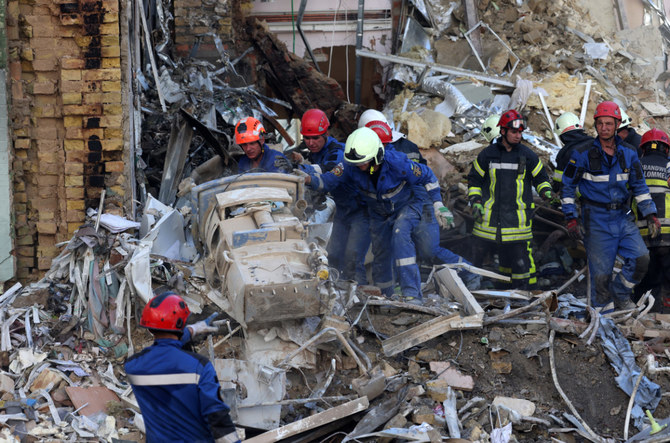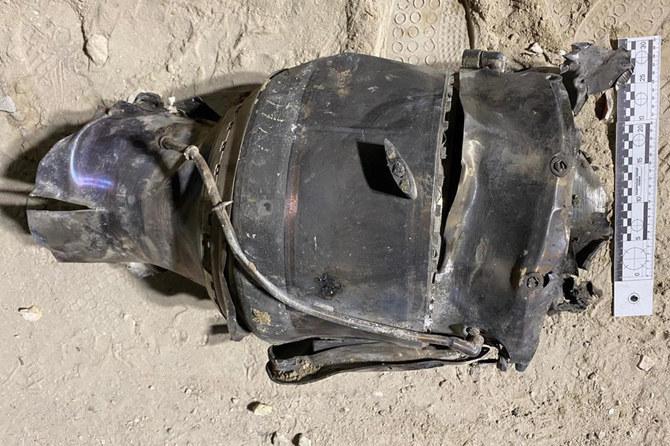WARSAW: The Kh-101 cruise missile that struck a children’s hospital in Kyiv in early July perfectly illustrates the ability of the Russian defense industry to overcome Western efforts to cut its supply of key components.
The July 8 attack, which killed two people and damaged large portions of the surrounding buildings of the clinic treating about 600 patients, provoked international outrage.
Yet “just since the beginning of this week, Russia has used more than 700 guided aerial bombs, more than 170 attack drones of various types and almost 80 missiles against Ukraine,” said Ukrainian President Volodymyr Zelensky.
Long gone are the days when Western military officials would report that Russian military production capacity was insufficient to sustain the war in Ukraine, or when a Ukrainian official said Russian strikes would soon stop because of a lack of ammunition.
The Financial Times reported, without naming its sources, that Russia is now producing eight times as many Kh-101s as before its invasion of Ukraine in 2022.
Experts consulted by AFP would not confirm the figures, but all underscored Russia’s increased capacity to build more of these crucial cruise missiles.
“I would say the real number might be even higher,” said Vladislav Inozemtsev, a Russian economist who lives in exile. He estimates that Russia will make 700 to 750 this year and that production could reach 1,000 units in 2025.
“In April 2024, Ukrainian sources reported monthly production of 40 Kh-101 missiles,” much higher than the 56 produced over the whole of 2021, said a Western source in the arms sector.
However, the operating systems of these missiles require many components that are made in countries that support Kyiv and have imposed sanctions on Russia.
US-made AMD memory cards, Texas Instruments microcircuits and Dutch-made Nexperia buffer chips have all been found in the debris of Kh-101 strikes, according to the official site war-sanctions.gur.gov.ua.
“Not all the electronic components inside of Russian missiles are military grade. Many of them if not most are consumer-grade or industrial-grade and still available for Russia on the global market,” said Pavel Luzin, a specialist in Russian defense policies.
“Moreover, there was a storage of electronic components in Russia made before 2022.”
With the help of friendly countries, Russia has set up trading companies and “shows no signs of vulnerability in its supply chains,” said an industrial source.
“First, there are the Chinese who supply the Russians with many kinds of dual-use products which are successfully used by the military industry,” Inozemtsev said.
The industrial source added: “The main foreign components found on the Kh-101 wrecks today are American or Taiwanese commercially available processors, purchased by Russian trade missions in embassies abroad or through shell companies.”
Some countries have become important hubs.
In a report published in late 2023, British research institute Rusi said that “faced with losing access to essential supply lines, Russia adapted, rerouting trade flows through friendly jurisdictions and bordering countries, often using complex front-company networks to evade scrutiny.”
“For example, in 2022, Armenia’s microelectronics imports from the US and EU increased by over 500 and 200 percent, respectively, with most of these later re-exported to Russia.”
Rusi also noted that the value of Kazakhstan’s microelectronics exports to Russia increased from around $250,000 in 2021 to over $18 million in 2022.
But sometimes these sales pass directly through Western countries, Rusi said, such as purchases by Russian company Compel JSC from Germany.
A Stuttgart court sentenced a 59-year-old Russian-German man on Wednesday to almost seven years in prison for having supplied 120,000 components and other pieces of equipment to Russia between January 2020 and May 2023.
“There is little that can be done to stop these flows,” Inozemtsev said.
“The only efficient thing would be to consider sanctions against Western semiconductor producers to force them to better vet their clients. But such measures would be too painful for Western companies.”
fz-ant-bur/alf/gv/rlp/rsc
AMD — ADVANCED MICRO DEVICES
TEXAS INSTRUMENTS
































